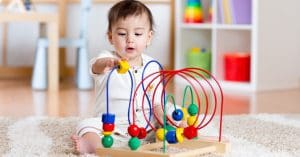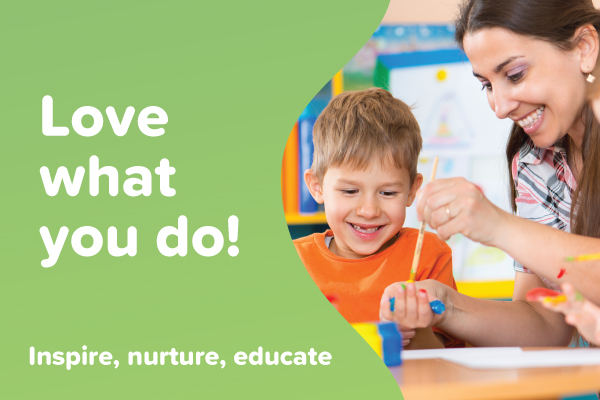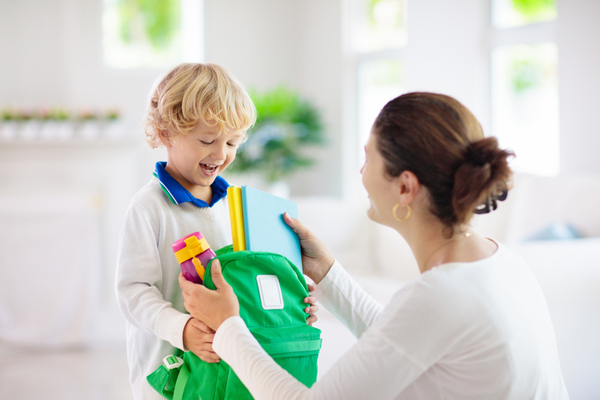In Australia, play-based learning is at the centre of the way we approach early childhood education. This is underpinned by the Early Years Learning Framework and National Quality Standard, each highlighting the importance of incorporating play and exploration into early childhood learning experiences.
Play is one of the most critical ways a child learns and develops. It goes without saying that playing is fun for children, but did you know it can shape the structural design of the brain? Research supports play-based learning as a key element for optimising children’s brain development.

How does play support a child’s development?
Play doesn’t just enhance one area of a child’s development, but provides a powerful starting point for a holistic approach to early learning. Play can support physical, cognitive, social and emotional development, as well as literacy and numeracy. Let’s look at the role of play for each of these areas:
Physical development
Moving the body, working on those fine and gross motor skills and getting to know what we can achieve physically is a cornerstone of children’s development from birth. Play can promote physical development through exploration of the world around us as well as our own capabilities. Running, climbing, dressing dolls, stringing beads — it’s all fun and games, while working on key physical skills.
Cognitive development
Paying attention, developing memory and recall, problem-solving skills — play can support cognitive development through play with games, adventures and explorations. Work in colours, shapes, letters and more to build on cognition through play. This can also enhance literacy and numeracy too.
Social and emotional development
Play encourages children (and adults!) to use their imaginations. Playing different roles, exploring different characters and making choices for them. It also promotes the use of social skills such as negotiation when you want to have a turn or working together for a game to work. Self-esteem can be built through play too, through sense of accomplishment when a child does what they set out to do. Similarly, resilience can be built through the realisation that you might not always get it right but you can keep trying.
Utilising the power of play
Harnessing the benefits of learning through play to gain a host of benefits for children means leveraging children’s natural interest to improve their learning and development. This means they are getting the most from their learning while doing something they genuinely enjoy. There are many benefits to continue going back to play to create engaging experiences for children:
- Learning through play can occur anywhere: Indoors, outdoors, in classroom settings, at the park, at a train station — you name it, you can bring play-based learning and exploration along with you.
- Enhances learning outcomes: Play makes learning accessible and engaging, and research indicates that a child who is engaged in their learning experiences will have enhanced outcomes.
- Reduces stress: When play is occurring alongside fun and adventure, there is less pressure to ‘get it right’ and more encouragement to explore and self-reflect. Play is well-known to reduce stress and anxiety and can nurture educator/child relationships. There are a also a range of sensory learning experiences that are particularly relaxing.
- It incorporates physical activity: Movement is a must at any age to live a healthy life and optimise development. Play makes adding movement into learning simple.
- Supports social interaction: Developing a sense of belonging and togetherness with others is important. Additionally, learning to interact effectively with others and take turns are essential in childhood. Play-based learning brings about these opportunities in a variety of settings.
- Facilitates appropriate risks: Testing boundaries and seeking challenges are natural parts of development. Different types of exploration through play let children take appropriate risks within a safe, nurturing environment.
Quick tips to incorporate more play
So, how can early childhood educators incorporate play-based approaches to learning in their activity plans?
When putting together your activity plan, incorporate a balance of physical play, sensory play, outdoor play, role play, unstructured play, creative play and play with toys. Keeping a holistic approach will ensure you have a well-rounded approach to play-based learning for your service.
We have compiled some ideas to help inspire you. And if play is already a top priority for your early childhood service, you just might find some fresh inspiration!
Play ideas for babies
Help babies explore the world by moving their positions so they get lots of different perspectives. Imitate babies sounds and smile back at babies. Show babies different colours, textures and sounds. Begin to show cause and effect by showing babies how things fall when dropped or thrown. Ensure lots of colours and textures are on offer. Play games like peek-a-boo or hide items behind your back and return them.
Play ideas 1 – 3 years old
Encourage dress ups and role play — this might be acting out stories children love or pretending to be different animals. Explore music through singing and instruments. Add in movements to promote physical development. Get messy in mud kitchens, with paint, in sand and even in puddles. Any time of year is fine for outdoor play as long as you have the right attire, so don’t shy away from getting outside when it’s raining. Set out objects, memorise then remove some and see if children can remember what is missing.
Play from 4 – 6 years old
Get cooking to explore textures, smells and flavours, not to mention science. Climbing, somersaults, balance beams and hopscotch further promote physical development. Play house with dress ups and role play, explore relationships and characters.
Remember, play doesn’t always need to be go, go, go. Quiet time and relaxation are just as vital for healthy development at any age.
Keep checking our blog for support and ideas to create the best early childhood education experience for children in your care.



